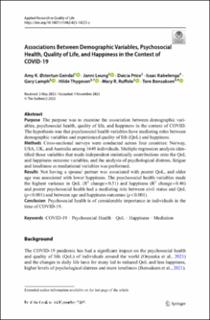| dc.contributor.author | Geirdal, Amy Østertun | |
| dc.contributor.author | Leung, Janni | |
| dc.contributor.author | Price, Daicia | |
| dc.contributor.author | Kabelenga, Isaac | |
| dc.contributor.author | Lamph, Gary | |
| dc.contributor.author | Thygesen, Hilde | |
| dc.contributor.author | Ruffolo, Mary | |
| dc.contributor.author | Bonsaksen, Tore | |
| dc.date.accessioned | 2024-02-02T10:06:47Z | |
| dc.date.available | 2024-02-02T10:06:47Z | |
| dc.date.created | 2023-11-15T09:37:24Z | |
| dc.date.issued | 2023 | |
| dc.identifier.citation | Applied Research in Quality of Life. 2023, 1-15. | en_US |
| dc.identifier.issn | 1871-2584 | |
| dc.identifier.uri | https://hdl.handle.net/11250/3115236 | |
| dc.description.abstract | Purpose The purpose was to examine the association between demographic vari- ables, psychosocial health, quality of life, and happiness in the context of COVID. The hypothesis was that psychosocial health variables have mediating roles between demographic variables and experienced quality of life (QoL) and happiness. Methods Cross-sectional surveys were conducted across four countries: Norway, USA, UK, and Australia among 1649 individuals. Multiple regression analysis iden- tified those variables that made independent statistically contributions onto the QoL and happiness outcome variables, and the analysis of psychological distress, fatigue and loneliness as mediational variables was performed. Results Not having a spouse/ partner was associated with poorer QoL, and older age was associated with lower happiness. The psychosocial health variables made the highest variance in QoL (R2 change = 0.51) and happiness (R2 change = 0.46) and poorer psychosocial health had a mediating role between civil status and QoL (p < 0.001) and between age and happiness outcomes (p < 0.001). Conclusion Psychosocial health is of considerable importance in individuals in the time of COVID-19 | en_US |
| dc.language.iso | eng | en_US |
| dc.rights | Navngivelse 4.0 Internasjonal | * |
| dc.rights.uri | http://creativecommons.org/licenses/by/4.0/deed.no | * |
| dc.title | Associations Between Demographic Variables, Psychosocial Health, Quality of Life, and Happiness in the Context of COVID-19 | en_US |
| dc.type | Peer reviewed | en_US |
| dc.type | Journal article | en_US |
| dc.description.version | publishedVersion | en_US |
| cristin.ispublished | true | |
| cristin.fulltext | original | |
| cristin.qualitycode | 1 | |
| dc.identifier.doi | 10.1007/s11482-023-10255-z | |
| dc.identifier.cristin | 2196843 | |
| dc.source.journal | Applied Research in Quality of Life | en_US |
| dc.source.pagenumber | 1-15 | en_US |

